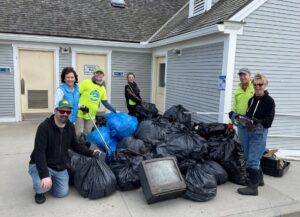 HYANNIS – When you put the words ‘poverty’ and ‘children’ together, it’s easy to form a picture in your mind and think of a sad statistical minority. But, according to the 2017 report from the National Center for Children in Poverty, 43 percent of children in this country live in low-income families and an additional 21 percent live in poverty. Many more children live in families with incomes just above the poverty threshold.
HYANNIS – When you put the words ‘poverty’ and ‘children’ together, it’s easy to form a picture in your mind and think of a sad statistical minority. But, according to the 2017 report from the National Center for Children in Poverty, 43 percent of children in this country live in low-income families and an additional 21 percent live in poverty. Many more children live in families with incomes just above the poverty threshold.
Massachusetts is not exempt from this problem. Currently 44 percent of children in Massachusetts are using the free or reduced lunch program and that number has risen each year.
According to Project Bread, more than 200,000 children in Massachusetts have a parent that earns less than $11 an hour. It’s not a coincidence that the same number of children skips at least one meal a day. Today, post-recession, the rate of household hunger in this state is 71 percent higherthan it was just a decade ago.
The implications of such widespread poverty are serious. A study published in JAMA Pediatrics in July 2015 indicates that poorer children develop smaller brains. The researchers suggest that this could explain why there is as much as a 20 percent achievement gap between students from low income brackets and their wealthier peers.
“We’ve known for a while that there is a higher rate of poor cognitive and academic performance in children living in poverty, but now we really know why,” said pediatrician Kathryn Rudman, MD, at Seaside Pediatrics in West Yarmouth. “When we see these studies that show these actual brain changes it is really frightening, especially when you consider the number of kids that fit into this poverty level.”
Even though the subject of poverty is a sensitive one, it’s important to put political correctness aside because this information needs to be talked about in more forums, she said.
“These are our neighbors, these are our kids’ friends, and it really takes a village of teachers and other parents and pediatricians and anybody that interacts with kids to fix this problem, because there are so many things that can help,” Dr. Rudman said.
Helping Parents Too
The answer is not just helping the child, but the parents, as well, so they can provide support and education, she said. At her pediatric practice, doctors regularly refer children to programs like Early Intervention, Head Start, the Boys & Girls Club and the YMCA where they can find positive connections with other children and learn healthy habits. They also give out free books to children at every wellness visit as part of the Reach Out and Read program.
[RELATED: Reading is good for the brain, even for babies]
Programs like Early Intervention and Head Start are especially important because intervention in the early years is critical. A study published in The American Journal of Psychiatry in January 2016 indicates that children who experience poverty measured by an income-to-needs ratio at the pre-school age are more likely to suffer from depression later in life.
“The studies are very clear,” said Anne Colwell, CEO of Cape Cod Child Development. “For the first time we have real research and data that is very consistent to what we are seeing with the children.”
In one of the largest studies to date on the subject of poverty and the child’s brain, researchers looked at 1,099 children between the ages of 3 and 20 years. They found that among children from the lowest-income families, small differences in income were associated with relatively large differences in the parts of the brain responsible for skills associated with academic success.
The same difference was not found with incremental increases in income level with children living in higher income families. Higher income was also associated with better outcomes in cognitive skills.
“Not only do we have medical evidence of what is happening, but this supports the efficacy of early parenting intervention to support a more optimal adaptive outcome,” Colwell said. “Without question, when these babies are born, the more we can do to intervene, the better the outcomes over the long term.”
The Importance of Preschool
Colwell pointed to the Perry Preschool Study, the only longitudinal study of the effects of attending pre-school on a child’s life up to the age of 40. Children were randomly assigned to two groups. Children in one group received high quality preschool, and children in the other group had no preschool. The children who had attended preschool earned more money, had higher rates of employment, higher rates of graduating from high school and were less likely to have been arrested.
“The study shows that if we fund programs and services to economically disadvantaged children, the better the economic investment, the better the outcomes,” she said. “The Perry Preschool Study showed that every investment of $15,000 per child returns a total public benefit of $195,000 of return in human capital.”
By the age of 40, according to the study, the children who received high quality preschool completed more schooling, had significantly fewer teen pregnancies and were much less likely to have spent time in jail. They also had higher monthly incomes and relied less on public assistance programs.
Colwell believes the best thing we could do as a society is to fund universal pre-school programs like the ones offered by CCCD’s Head Start Program. Family involvement is at the heart of Head Start, which uses a two-generational approach that is not only about cognitive development, but also about nutrition, medical and dental health, adult attachment and referral to resources.
“I think what makes Head Start unique is the ability to wrap our arms around the whole family and to help them be successful,” Colwell said. “This is not a hopeless situation. It’s a situation that is reconcilable if we put more resources towards it in early childhood.”
Children on the Lower Cape don’t have access to the Head Start Preschool program because the buses only run as far as Dennis, but the Cape Cod Children’s Place offers early childhood education programs for infants and toddlers at two sites in Eastham and Wellfleet. In addition to childcare, the Children’s Place is a resource center for parents, that offers support, referrals, education, play groups, and home visits.
A typical week for executive director Cindy Horgan can include attending a meeting at an elementary school about hunger issues, teaching a workshop on the dangers of technology, giving a talk about preparing your child for kindergarten, and doing a home visit with a family that needs some support with parenting skills.
“At the end of the day, despite all that we do, I believe there is still a population we don’t ever see,” Horgan said. “We figured out that you just can’t offer parenting classes and think that’s going to fill the need. Not everybody is going to come to a parenting class, but they may be willing to have a one-on-one conversation to talk about things that they are struggling with.”
Nutrition and Relationships
Horgan repeatedly stresses the message to parents that the three most important ingredients for healthy children are proper nutrition, lots of water (not juice or soda) and adequate sleep.
“When you’re looking at what a child’s brain needs every single day to be the best it can be, good nutrition is the key,” she said. “But the other piece that is key to the wellness of their brain is relationships and healthy experiences in their world.”
Horgan has recently begun using the term “emotional poverty” in her work because she is now seeing a generation of children who are being brought up with parents who aren’t connecting with them because of technology.
She sees evidence of it in the odd-shaped heads of babies who spend too much time in infant seats rather than being held. She also said that family dinners are a crucial time to bond because they create an important back and forth conversation that is critical for brain development.
In some ways, emotional poverty can be even more devastating than lack of money.
“I can guarantee that there have been children who have been brought up with very few resources who have really done amazing things in this lifetime and it’s because of good relationships,” she said.























